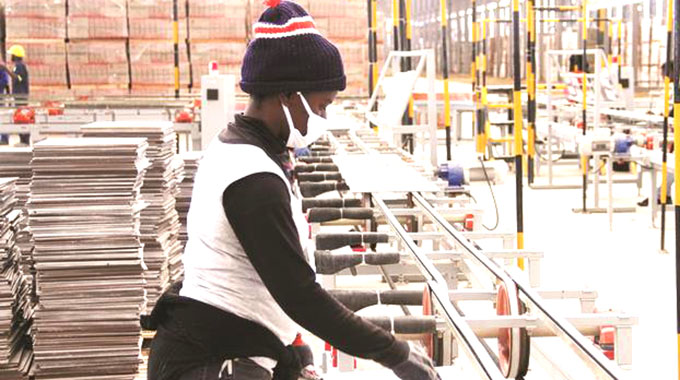Women take Sadc building industry by storm

Roselyne Sachiti Features, Health & Society Editor
Pamela Nyamuruswa (32), a mother of three children, keeps her eyes glued on the production line. One by one, floor tiles either pass through her or are removed if she notices a defect.
She quickly picks up a tile with a small crack and marks an X on it, placing it in a pile between her and her colleagues. From here, the defective tiles are graded and will not make it to the regional market.
At Sunny Yi Feng Tiles in Norton, Zimbabwe, which started making tiles on May 12, this year, a total of 100 other women on her shift do the similar job of flushing out defects on the between 30 000 to 35 000 square metres of tiles manufactured here each day.
Some tiles are for the Zimbabwean market where construction of homes has taken a big boom requiring tiles for floors and walls.
Of the manufactured tiles, 70 percent are exported to several countries in the SADC region where the construction explosion, especially housing, is also taking place. Numerous property developments in housing are currently underway across the SADC region. This has increased trade between Zimbabwe, South Africa, Botswana, Zambia, Malawi and Mozambique.
Such high demand makes Leslie Muchairi (26), another tile grader at Sunny Yi Feng Tiles, and several other women work harder to ensure that only the highest quality passes through them.
“I let the good tiles pass and pick up all those with defects. Some may have a crack on the side, others may have a wrong colour shade. The defects differ and I have to be aware of each,” said the mother of one.
She says she now feels empowered. The tile grading job being her first ever job, Muchairi is excited as she now has a salary and no longer worries about taking care of her small family.
“I do not worry about food, rentals or my child’s school fees anymore. I plan in advance and when I get my salary, I pay all my bills,” she says, keeping her eyes on the moving tiles.
Juliet Masulu (19) is a team leader for a group of 10 women. It is her first ever job, which she thought she would never get.
“It being a factory, I thought all the jobs here were for men. I was surprised when first, I got the tile sorting job and then became team leader. It is like any other job and I enjoy it,” she explains.
The factory is like a beehive and when the women work, they are aware of the demands from the SADC region ensuring only the best quality leaves the factory for export.
If one looks left, right, in front, behind, anywhere and everywhere, women are busy doing other various jobs, and they deliver.
Such scenes have become the order of day at the factory.
Of the 1 193 locals and 180 Chinese technicians working there, 320 are Zimbabwean women from surrounding areas. The 320 women have proved their mettle in a territory which is usually a preserve for men.
Other women work in departments that include marketing, the canteen, logistics and security. Some women bridge the language gap as they interpret Shona and English into Mandarin, Mandarin into Shona and English.
Sunny Yi Feng vice managing director Mr William Gung said they were economically empowering local women as over 60 percent of those working in the factory reside in Norton and Porta Farm. Others are from as far afield as Chinhoyi, Masvingo and Mutare.
“We hire women so that they can earn money to sustain their families. We believe in empowering women through employment opportunities,” he said last Friday.
Mr Gung said that very soon, they will also be going into sanitaryware production.
“We will train the women on how to make sanitaryware and tableware. Tableware sometimes needs handiwork and women are good at this,” he revealed.
He added that their maternity leave policy is in line with Zimbabwe’s laws.
Zimbabwe’s Labour Relations Act provides maternity leave upon production of a medical certificate. Female employees are granted maternity leave for a period of 98 days on full pay.
Mr Gung added that they believe in equal pay for equal work and as such women working at the tile making factory earn the same salary as their male counterparts for the same job.
“We do not discriminate against women. Soon, we will be opening our table and sanitaryware factory, which is also located here. We need between 400 and 500 workers of whom 70 percent will be women. Zimbabwean women are principled and work very hard,” he said.
If anything, Zimbabwe’s Labour Act prohibits discrimination in wages on the basis of sex.
Moreover, SADC Heads of State and Government signed and adopted the SADC Protocol on Gender and Development in August 2008 with the exception of Botswana and Mauritius. Out of the 13 member states that have signed, 11 have already ratified the protocol.
The objectives of the protocol are, among others, to provide for the empowerment of women, to eliminate discrimination and to achieve gender equality and equity through the development and implementation of gender-responsive legislation, policies, programmes and projects.
The protocol thus consolidates and creates synergies between various commitments on gender equality and women’s empowerment into one comprehensive regional instrument that enhances the capacity to plan, implement and monitor the SADC Gender agenda effectively.
According to the SADC website, the SADC Women’s Economic Empowerment Framework is also intended as a step towards developing and implementing a regional Women’s Economic Empowerment Programme to facilitate strengthened coordination and implementation of the SADC region’s commitments on women’s economic empowerment.
Article 17 of the SADC Protocol on Gender and Development deals specifically with economic empowerment, and requires that member states meet the following commitments by 2015:
Adopt policies and enact laws which ensure equal access, benefit and opportunities for women and men in trade and entrepreneurship, taking into account the contribution of women in the formal and informal sectors;
Review their national trade and entrepreneurship policies, to make them gender responsive; and
With regard to the affirmative action provisions in Article 5, introduce measures to ensure that women benefit equally from economic opportunities, including those created through public procurement process.
Last week, Zimbabwe’s Information, Publicity and Broadcasting Services Minister, Monica Mutsvangwa; Industry and Commerce Minister Nqobizitha Mangaliso Ndlovu and Justice, Legal and Parliamentary Affairs Minister Ziyambi Ziyambi toured the company.
They were accompanied by Secretary for Information, Publicity and Broadcasting Services Mr Nick Mangwana.
“In three months (they started manufacturing), they have started producing for export and it’s just wonderful to see products going to South Africa, to Zambia and that product is coming from Zimbabwe,” said Minister Mutsvangwa.
“That is a good response to our President’s call that ‘Zimbabwe is Open for Business’. This is the kind of investment that we need that has downstream benefits for our people. I am also happy that we have seen our young women, our young mothers being employed and I am happy that they can now look after their children and after their families.”
In the factory, several forklifts carry crates loaded with tiles taking them to the loading bay where a truck bound for Malawi awaits. Another batch of tiles is being loaded onto a truck bound for Zambia.
Masulu (mentioned above) and other female colleagues on her shift smile as they see the products of their sweat leaving the factory and being loaded.
She does not know the end users in the two SADC countries where the tiles are going, but she hopes anyone who buys them will be satisfied with her team’s work.
“I am happy that someone in Malawi who is building a house, or offices or in the construction business will use quality tiles that I helped make. I hope they know women played a role in the manufacturing of the tiles,” she says with a broad smile.
The tiles she helped make will in a few days land in Malawi. In Malawi, the tiles will be used in the construction industry in which women are also participating and sustaining their families.
In Malawi, a women gender survey conducted by WFP in 2016 on construction work in six schools in Salima district found that all women engaged WFP-related construction work used their wages to buy food. All the women reported that their families had been able to meet their food requirements during the November-March lean season thanks of their participation in the construction activities.
Writing in The World Food Programme Insight Malawi, Francis Thawani says the country’s construction industry is mostly considered as a no-go area for women. In most rural communities, women are not considered equal to the task, which holds them back in the labour market. In the few instances where women are allowed to participate in construction, they are usually engaged as unskilled labourers.
“However, women from Salima district have defied the odds. In June, 27 women graduated from a pilot training scheme on gender and construction . . .
“The women were trained in bricklaying, electrical installation, plumbing and carpentry — essential skills for erecting feeding shelters and building sanitary facilities for schools. Prior to this, the women underwent gender training that helped them analyse issues and find solutions to the challenges they face,” Thawani writes in the WFP Insight.
The tiles Masulu and her female colleagues help make may also end up in the hands of Omba Lacey, one of the many dynamic entrepreneurs from Lusaka who has been running a house construction business in the Zambian capital since 2007 and last year took part in an ILO training course “Start and improve your green construction business”.
As the women concentrate on their work inside the Norton factory, one by one the crates are loaded and ready to feed the appetite of the hungry SADC region. Hopefully, the more the tiles leave for the export market, the more job opportunities for women in Zimbabwe and other SADC countries.









Comments